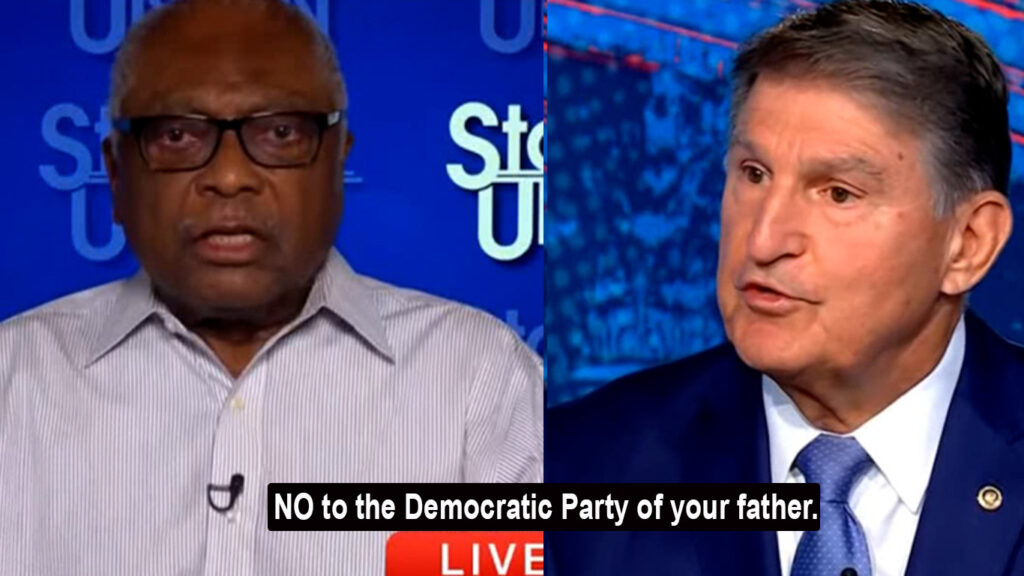Sen. Manchin, like MAGA, wants to return to the America of the past. The Democratic Party’s progressives will not return, and Rep. Clyburn and my narrative makes that clear.
Rep. Clyburn reality checks Sen. Manchin.
Podcasts (Video — Audio)
In a revealing exchange on CNN’s “State of the Union,” Senator Joe Manchin and Representative Jim Clyburn offered starkly contrasting views on the evolution of the Democratic Party. Manchin’s nostalgic longing for the Democratic Party of his father’s era contrasts sharply with Clyburn’s embrace of the party’s progress. This discourse highlights a broader ideological struggle within the party, reflecting on historical context, socioeconomic realities, and the party’s future direction.
Senator Manchin, hailing from a small coal mining community in West Virginia, reminisced about the Democratic Party of the past. He fondly recalled the era of John F. Kennedy, emphasizing a time when, in his view, Americans asked not what their country could do for them but what they could do for their country. Manchin lamented that the Democratic Party has shifted away from this ethos, now focusing more on what the government can do for individuals rather than fostering self-reliance and fiscal responsibility. He criticized the party for what he perceived as an overreliance on government assistance, turning citizens into dependents rather than empowering them.
Manchin’s perspective resonates with many in Appalachia, who feel that their contributions to the nation—mining coal, making steel, and serving in the military—are overlooked by modern Democratic leadership. This sentiment underscores a broader narrative of disenfranchisement and cultural disconnection that many working-class Americans experience. Manchin’s critique is that the Democratic Party has become too focused on progressive policies at the expense of traditional working-class values.
Enter Representative Jim Clyburn, a stalwart of the modern Democratic Party and a key figure in its mid-to-progressive wing. Clyburn, whose political career began in the era of segregation and civil rights struggles, countered Manchin’s nostalgia with a dose of historical reality. He reminded viewers that the Democratic Party of the past excluded African Americans and marginalized other minorities. The opening of the Democratic Party to African Americans in 1948 marked a significant and positive shift, making the party more inclusive and representative of the diverse American populace.
Clyburn’s argument is rooted in the belief that the Democratic Party’s evolution reflects America’s progress toward greater equality and social justice. He sees the party’s shift as a necessary response to the country’s changing demographics and needs. By embracing progressive values, the party aims to address systemic inequalities and provide opportunities for all citizens, not just the privileged few. Clyburn’s vision is one of an inclusive, equitable, and forward-looking party.
The clash between Manchin and Clyburn’s statements symbolizes a more significant ideological battle within the Democratic Party. On one side, there is a desire to return to a perceived golden age of American politics, where self-reliance and limited government were the norms. On the other side, there is a push to address the deep-seated inequalities that have plagued the nation, advocating for government intervention to level the playing field.
Manchin’s call for a return to fiscal conservatism and limited government assistance reflects a traditionalist view that many in his home state of West Virginia share. Ironically, his constituents are more dependent on government than the constituents of most Democratic states. His constituents have seen industries decline and communities suffer, and there is a palpable sense of being left behind because of the policies Republicans and Joe Manchin support. However, this perspective often overlooks the structural changes in the economy and society that have necessitated a more robust social safety net and proactive government policies.
Clyburn’s rebuttal highlights the importance of acknowledging and addressing these structural changes. The Democratic Party’s progressive wing argues that policies promoting social welfare, healthcare access, and economic justice are essential to building a fairer society. They contend that the government has a crucial role in correcting market failures and ensuring that all citizens have the opportunity to succeed.
Moreover, the progressive critique of the wealthy’s outsized influence in politics and the economy is central to this debate. The argument posits that the economic system is rigged in favor of the rich, who benefit from tax breaks, subsidies, and deregulation at the expense of the working class. This critique aligns with Clyburn’s call for a Democratic Party that stands up for ordinary Americans against the excesses of corporate power.
The contrast between Manchin’s and Clyburn’s perspectives reflects the dynamic and evolving nature of the Democratic Party. It is a party grappling with its identity and mission in a rapidly changing America. The debates within the party are crucial for shaping its future direction and ensuring that it remains relevant to its constituents’ diverse needs and aspirations.
The contrasting statements by Senator Joe Manchin and Representative Jim Clyburn on CNN’s “State of the Union” underscores a significant ideological divide within the Democratic Party. Manchin’s nostalgia and Clyburn’s embrace of progressive change highlight the broader struggle over the party’s identity and future. This debate is not just about the past or the present but about what kind of Democratic Party we want to build for the future and what kind of America we want to evolve into. The path forward requires balancing respect for tradition with a commitment to progress and inclusivity, ensuring that the party remains a powerful force for positive change in American society.
Viewers are encouraged to subscribe and join the conversation for more insightful commentary and to support progressive messages. Together, we can populate the internet with progressive messages that represent the true aspirations of most Americans.

